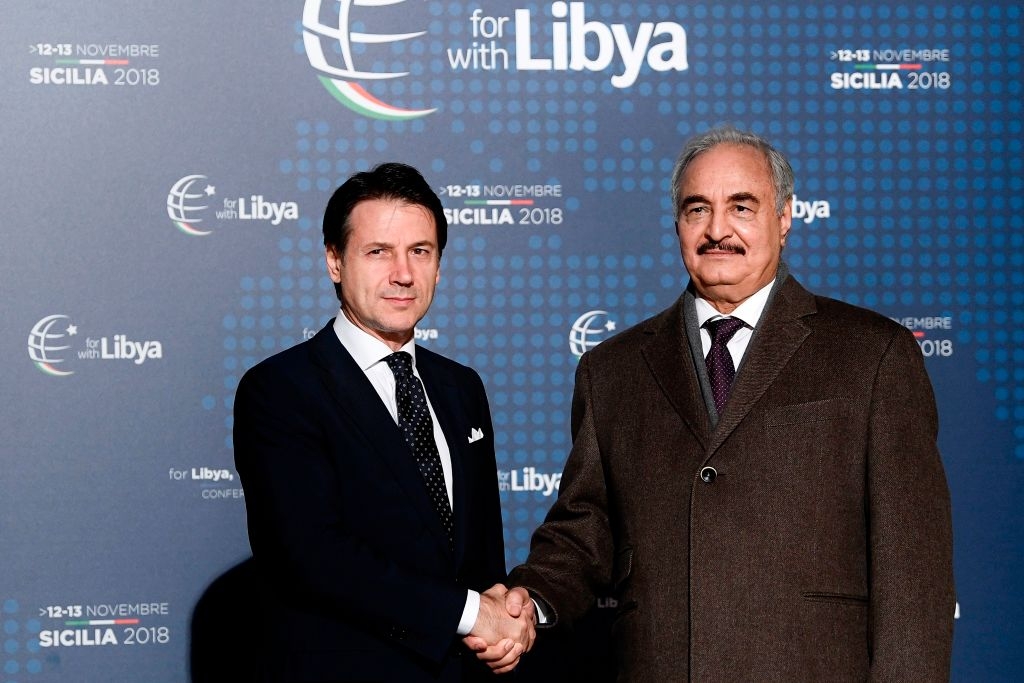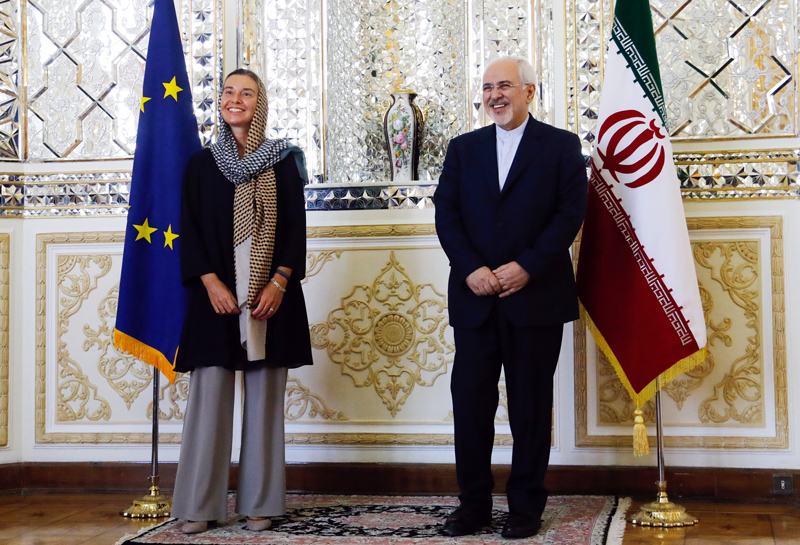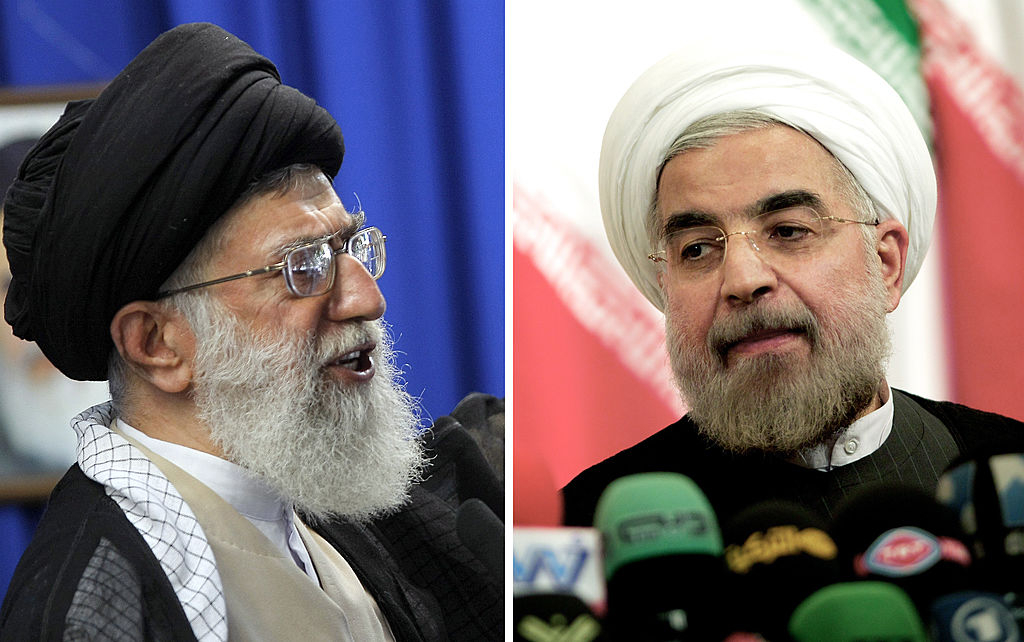|
In this mailing:
- Con Coughlin: Erdogan's Bold Plan for a New Muslim Brotherhood Regime in Libya
- Majid Rafizadeh: The EU Needs to Take Tougher Stance Towards Iran's Mullahs
- Peter Huessy: The US Must Facilitate Regime Change in Iran
by Con Coughlin • January 23, 2020 at 5:00 am
The concern now is that Turkish President Recep Tayyip Erdogan will use the failure of international mediators to end the fighting to intensify his support for the GNA, thereby strengthening the position of the numerous Islamist militias that are backing the UN-backed body.
Mr Erdogan was an ardent supporter of the Muslim Brotherhood when it held power in Cairo, and there is mounting concern, especially in Europe, that the Turkish leader has now set his sights on establishing a similar regime in Libya.

Support for Libya's rebel leader General Khalifa Haftar has grown as a result of his claim that one of the key aims of his military campaign is prevent the country from falling into the hands of Islamist militias which have aligned themselves with the UN-backed Government of National Accord (GNA). Pictured: Haftar (right) meets with Italian Prime Minister Giuseppe Conte on November 12, 2018 in Palermo, Italy. (Photo by Filippo Monteforte/AFP via Getty Images)
Turkish President Recep Tayyip Erdogan's decision to intervene militarily in the Libyan conflict not only raises the prospect of the conflict entering a new and more dangerous phase; it also promises to provide a significant boost for the Islamist militias that are vying to take control of the country and establish a Muslim Brotherhood-style government in Tripoli.
Mr Erdogan's justification for sending Turkish troops to Libya, which has the backing of the Turkish parliament, is to provide support for Prime Minister Fayez al-Serraj, the head of the UN-backed Government of National Accord (GNA).
The GNA is under enormous pressure as a result of the offensive being undertaken by General Khalifa Haftar, the rebel Libyan leader who, with the backing of Russia, France and the United Arab Emirates, has overrun large swathes of the country and is now attempting to seize control of the Libyan capital.
by Majid Rafizadeh • January 23, 2020 at 4:30 am
It is worth noting that, the EU did announce a positive step. In light of the revelations concerning Iran's assassinations plots, minor sanctions were imposed on sectors of the Iranian Ministry of Intelligence, as well as on Saeid Hashemi Moghadan, the deputy intelligence minister.
However, these do not go nearly far enough, particularly if the EU is inclined to continue its support for the JCPOA.
It is incumbent upon the EU to stop softening its tone toward the Islamic Republic, and instead join the Trump administration in imposing maximum pressure on the ruling mullahs of Iran. The more the EU appeases the Iranian government, the more it empowers it to pursue aggressive and terrorist activities.

It is incumbent upon the European Union to stop softening its tone toward the Islamic Republic, and instead join the Trump administration in imposing maximum pressure on the ruling mullahs of Iran. The more the EU appeases the Iranian government, the more it empowers it to pursue aggressive and terrorist activities. Pictured: The EU's then High Representative for Foreign Affairs and Security, Federica Mogherini (left), laughs with Iranian Foreign Minister Javad Zarif, during her August 2017 visit to Iran. (Image source: European External Action Service/Flickr)
The European Union really needs to do two things as soon as possible: stop criticizing the Trump administration for its Iran policy, and halt its appeasement policies toward the ruling mullahs of Iran who have committed some of the worst crimes against humanity, not only in Iran but abroad.
On January 19, 2020, British Prime Minister Boris Johnson and French President Emmanuel Macron reiterated their commitment to keep Iran nuclear deal alive. Europe has been working to implement a special purpose vehicle that will allow countries to continue trading with Iran, despite US sanctions, known as INSTEX.
by Peter Huessy • January 23, 2020 at 4:00 am
Aiding the Iranian people to oust the regime does not, however, require the US to launch a full-fledged war with the Islamic Republic.
On the contrary, a four-pronged strategy of maximum pressure -- involving continued financial pressure on the mullahs; helping local forces expel Iranian proxy groups from Iraq, Lebanon and Yemen; supporting the Iranian protesters through a robust social-media campaign promising a future without repression and terror, and using appropriate military force to deter and protect our interests -- would get the job done without troops on the ground.

The goal of US policy on Iran, really to exert "maximum pressure," should be the change of the mullah-led regime in Tehran before it is armed with nuclear weapons, becomes the hegemon of the Persian Gulf and commands much of the world's oil and gas. Pictured: Iran's "Supreme Leader" Ayatollah Ali Khamenei (left), and President Hassan Rouhani. (Photo by Behrouz Mehri/AFP via Getty Images)
The goal of US policy on Iran, really to exert "maximum pressure," should be the change of the mullah-led regime in Tehran before it is armed with nuclear weapons, becomes the hegemon of the Persian Gulf and commands much of the world's oil and gas. Iran is already seeking to take over Iraq, OPEC's second-largest crude oil producer, with the fifth-largest oil reserves, in the world.
But helping to spur the end of the Iranian empire -- or, at least, keeping its power in check -- cannot be accomplished without a clear knowledge and understanding of the nature of the regime.
|
|
|
|
No comments:
Post a Comment